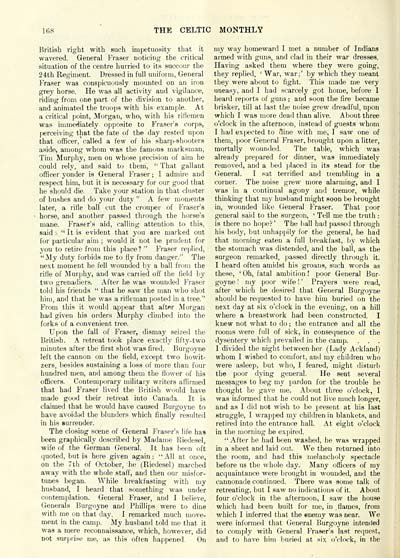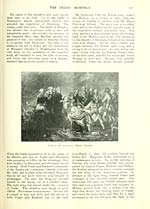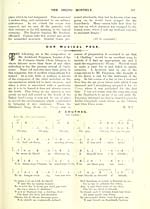Blair Collection > Celtic monthly > Volume 5, 1897
(242)
Download files
Complete book:
Individual page:
Thumbnail gallery: Grid view | List view

168
THE CELTIC MONTHLY
British right with such impetuosity that it
wavered. General Fraser noticing the critical
situation of the centre hurried to its succour the
24lh Regiment. Dressed in full uniform, General
Fraser was conspicuously mounted on an iron
grey horse. He was all activity and vigilance,
riding from one part of the division to another,
and animated the troops with his example. At
a critical point, Morgan, who, with his riflemen
was immediately oppcsite to Fraser's corps,
jierceiving that the fate of the day rested upon
that officer, called a few of his sharp-shooters
aside, among whom was the famous marksman,
Tim Murphy, men on whose precision of aim he
could rely, and said to them, '• That gallant
officer yonder is General Fraser ; I admire and
respect him, but it is necessary for our good that
he should die. Take your station in that cluster
of bushes and do your duty " A few moments
later, a rifle ball cut the crouper of Fraser's
horse, and another passed through the horse's
mane. Fraser's aid, catling attention to this,
said : " It is evident that you are marked out
for particular aim ; would it not be prudent for
you to retire from this place? " Fraser replied,
"My duty forbids me to fly from danger." The
next moment he fell wounded by a ball from the
rifle of Murphy, and was canied off the field by
two grenadiers. After he was wounded fi'raser
told his friends " that he saw the man who shot
him, and that he was a rifleman posted in a tree."
From this it would appear that after Morgan
had given his orders Murphy climbed into the
forks of a convenient tree.
Upon the fall of Fraser, dismay seized the
British. A retreat took place exactly fifty-two
minutes after the first shot was fired. Burgoyne
left the cannon on the field, except two howit-
zers, besides sustaining a loss of more than four
hundred men, and among them the flower of his
officers. Contemjiorary military writers affirmed
that had Fraser lived the Bi-itish would have
made good their retreat into Canada. It is
claimed that he would have caused Burgoyne to
have avoided the blunders which finally resulted
in hi.s surrender.
The closing scene of General Fraser'.s life has
been graphically described by Madame Kiedesel,
wife of the German General. It has been oft
quoted, but Is here given again: "All at once,
on the 7th of October, he (Riedesel) marched
away with the whole staff, and then our misfor-
tunes began. While breakfasting with my
husband, I heard that something was under
contemplation. General Fraser, and I believe.
Generals Burgoyne and Phillips were to dine
with me on that day. I remarked much move-
ment in the camp. My husband told me that it
was a mere reconnaissance, which, however, did
not surpri.se me, us this oflen happened Oil
my way homeward I met a number of Indians
armed with guns, and clad in their war dresses.
Having asked them where they were going,
they replied, ' War, war;' by which they meant
they were about to fight. 'This made me very
uneasy, and I had scarcely got home, before I
heard reports of guns ; and soon the fire became
brisker, till at last the noise grew dreadful, upon
which I was more dead than alive. About three
o'clock in the afternoon, instead of guests whom
I had exjjected to cline with me, I saw one of
them, poor General Fraser, brought upon a litter,
mortally wounded. The table, which was
already prepared for dinner, was immediately
removed, and a bed jilaced in its stead for the
General. I sat terrified and trembling in a
corner. The noise grew more alarming, and I
was in a continual agony and tremor, while
thinking that my husband might soon be brought
in, wounded like General Fraser. That poor
general said to the surgeon, ' Tell me the tiuth :
is there no hope?' The ball had passed through
his body, but unhappily for the general, he had
that morning eaten a full breakfast, by which
the stomach was distended, and the ball, as the
surgeon remarked, passed directly through it.
I heard often amidst his groans, such words as
these, ' Oh, fatal ambition ! poor General Bur-
goyne ! my poor wife ! ' Prayers were read,
after which he desired that General Burgoyne
should be requested to have him buried on the
next day at six o'clock in the evening, on a hill
where a breastwork had been constructed. I
knew not what to do ; the entrance and all the
rooms were full of sick, in consequence of the
dysentery which prevailed in the camp. . . .
I divided the night between her (Lady Ackland)
whom I wished to comfort, and my children who
were asleep, but who, I feared, might disturb
the poor dying general. He sent several
messages to beg my pardon for the trouble he
thought he gave me. About three o'clock, I
was informed that he could not live much longer,
and as I did not wish to be present at his last
struggle, I wrapped my children in blankets, and
retired into the entrance hall. At eight o'clock
in the morning he expired.
" After he had been washed, he was wrapped
in a sheet and laid out. We then returned into
the room, and had this melancholy spectacle
before us the whole day. Many officers of my
acquaintance were brought in wounded, and the
cannonade continued. There was some talk of
retreating, but I saw no indications of it. About
four o'clock in the afternoon, I saw the house
which had been built for me, in flames, from
which I inferred that the enemy was near. We
were informed that General Burgoyne intended
to comply with General Fraser's last reque.st,
and to have him buried at six o'clock, in the
THE CELTIC MONTHLY
British right with such impetuosity that it
wavered. General Fraser noticing the critical
situation of the centre hurried to its succour the
24lh Regiment. Dressed in full uniform, General
Fraser was conspicuously mounted on an iron
grey horse. He was all activity and vigilance,
riding from one part of the division to another,
and animated the troops with his example. At
a critical point, Morgan, who, with his riflemen
was immediately oppcsite to Fraser's corps,
jierceiving that the fate of the day rested upon
that officer, called a few of his sharp-shooters
aside, among whom was the famous marksman,
Tim Murphy, men on whose precision of aim he
could rely, and said to them, '• That gallant
officer yonder is General Fraser ; I admire and
respect him, but it is necessary for our good that
he should die. Take your station in that cluster
of bushes and do your duty " A few moments
later, a rifle ball cut the crouper of Fraser's
horse, and another passed through the horse's
mane. Fraser's aid, catling attention to this,
said : " It is evident that you are marked out
for particular aim ; would it not be prudent for
you to retire from this place? " Fraser replied,
"My duty forbids me to fly from danger." The
next moment he fell wounded by a ball from the
rifle of Murphy, and was canied off the field by
two grenadiers. After he was wounded fi'raser
told his friends " that he saw the man who shot
him, and that he was a rifleman posted in a tree."
From this it would appear that after Morgan
had given his orders Murphy climbed into the
forks of a convenient tree.
Upon the fall of Fraser, dismay seized the
British. A retreat took place exactly fifty-two
minutes after the first shot was fired. Burgoyne
left the cannon on the field, except two howit-
zers, besides sustaining a loss of more than four
hundred men, and among them the flower of his
officers. Contemjiorary military writers affirmed
that had Fraser lived the Bi-itish would have
made good their retreat into Canada. It is
claimed that he would have caused Burgoyne to
have avoided the blunders which finally resulted
in hi.s surrender.
The closing scene of General Fraser'.s life has
been graphically described by Madame Kiedesel,
wife of the German General. It has been oft
quoted, but Is here given again: "All at once,
on the 7th of October, he (Riedesel) marched
away with the whole staff, and then our misfor-
tunes began. While breakfasting with my
husband, I heard that something was under
contemplation. General Fraser, and I believe.
Generals Burgoyne and Phillips were to dine
with me on that day. I remarked much move-
ment in the camp. My husband told me that it
was a mere reconnaissance, which, however, did
not surpri.se me, us this oflen happened Oil
my way homeward I met a number of Indians
armed with guns, and clad in their war dresses.
Having asked them where they were going,
they replied, ' War, war;' by which they meant
they were about to fight. 'This made me very
uneasy, and I had scarcely got home, before I
heard reports of guns ; and soon the fire became
brisker, till at last the noise grew dreadful, upon
which I was more dead than alive. About three
o'clock in the afternoon, instead of guests whom
I had exjjected to cline with me, I saw one of
them, poor General Fraser, brought upon a litter,
mortally wounded. The table, which was
already prepared for dinner, was immediately
removed, and a bed jilaced in its stead for the
General. I sat terrified and trembling in a
corner. The noise grew more alarming, and I
was in a continual agony and tremor, while
thinking that my husband might soon be brought
in, wounded like General Fraser. That poor
general said to the surgeon, ' Tell me the tiuth :
is there no hope?' The ball had passed through
his body, but unhappily for the general, he had
that morning eaten a full breakfast, by which
the stomach was distended, and the ball, as the
surgeon remarked, passed directly through it.
I heard often amidst his groans, such words as
these, ' Oh, fatal ambition ! poor General Bur-
goyne ! my poor wife ! ' Prayers were read,
after which he desired that General Burgoyne
should be requested to have him buried on the
next day at six o'clock in the evening, on a hill
where a breastwork had been constructed. I
knew not what to do ; the entrance and all the
rooms were full of sick, in consequence of the
dysentery which prevailed in the camp. . . .
I divided the night between her (Lady Ackland)
whom I wished to comfort, and my children who
were asleep, but who, I feared, might disturb
the poor dying general. He sent several
messages to beg my pardon for the trouble he
thought he gave me. About three o'clock, I
was informed that he could not live much longer,
and as I did not wish to be present at his last
struggle, I wrapped my children in blankets, and
retired into the entrance hall. At eight o'clock
in the morning he expired.
" After he had been washed, he was wrapped
in a sheet and laid out. We then returned into
the room, and had this melancholy spectacle
before us the whole day. Many officers of my
acquaintance were brought in wounded, and the
cannonade continued. There was some talk of
retreating, but I saw no indications of it. About
four o'clock in the afternoon, I saw the house
which had been built for me, in flames, from
which I inferred that the enemy was near. We
were informed that General Burgoyne intended
to comply with General Fraser's last reque.st,
and to have him buried at six o'clock, in the
Set display mode to: Large image | Transcription
Images and transcriptions on this page, including medium image downloads, may be used under the Creative Commons Attribution 4.0 International Licence unless otherwise stated. ![]()
| Early Gaelic Book Collections > Blair Collection > Celtic monthly > Volume 5, 1897 > (242) |
|---|
| Permanent URL | https://digital.nls.uk/75853656 |
|---|
| Shelfmark | Blair.57 |
|---|---|
| Additional NLS resources: | |
| Attribution and copyright: |
|
| Description | A selection of books from a collection of more than 500 titles, mostly on religious and literary topics. Also includes some material dealing with other Celtic languages and societies. Collection created towards the end of the 19th century by Lady Evelyn Stewart Murray. |
|---|
| Description | Selected items from five 'Special and Named Printed Collections'. Includes books in Gaelic and other Celtic languages, works about the Gaels, their languages, literature, culture and history. |
|---|

